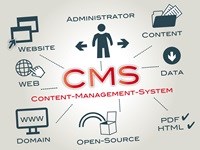





Often, they'll take one look at the daunting challenge of moving their content onto a new system, and decide that they'll rather stay where they are.

It's only when they start to see sales revenues and conversion opportunities start to leak that they take action. By then, they've lost out on a wealth of opportunities to drive cost efficiencies and grow profitability, and find themselves scrambling to catch up with competitors who are using content as a marketing tool in ever more sophisticated ways.
Legacy CMS platforms come with a number of drawbacks. They're often expensive to support, difficult to use, and extremely inflexible - factors that all limit the ways marketers can use content to attract and retain customers. Usually, marketers have to rely on separate tools to manage content across different channels, such as email, Web, mobile and social.
Worst of all, older platforms not easily integrated with the wealth of tools and systems marketers can use to gather and analyse data about their clients. That makes it hard to automate the process of matching relevant content to customers based on information such as demographics and behavioural data.
Given these drawbacks, it is time for marketers to start looking at platforms that allow them to deliver rich, personalised experiences to consumers across channels and devices, while providing the marketing department a unified view of the customer. Such platforms take a lot of the pain out of content management.
For example, they allow marketers to serve content for multiple channels from a single point. They can allow for automation and execution of campaigns across digital channels (Web, email, social, mobile) as well as traditional channels (call centre, direct mail, point of sale) in a uniform and consistent manner.
The operation cost-savings and efficiencies can start flowing through to engagement and conversion, almost immediately. Whether the user is accessing the content from a smartphone browser, an email in response to a phone call, or whether the user is browsing a landing page on a PC, the content can be resized, formatted and packaged automatically.
What's more, modern CMS platforms can draw on a wealth of customer data to personalise content to each user using a set of business rules. The result is that companies can improve performance of their content marketing and campaigns by performing robust audience segmentation and delivering marketing messages across channels.
The business case for relooking a CMS is strong if you're still using an older system that doesn't allow you to tap into your customer data and manage cross-channel campaigns in an efficient manner. As CMS platforms are integrated more tightly with other tools - including analytics, social media, and CRM platforms - they become ever more powerful.
The ultimate goal is to be able to engage with customers in real-time, giving them the content and messaging that is right for their needs at a given moment in time. Content supports every step of the customer journey, delivering interactions that increase sales and securing customer loyalty at each point of their journey.
